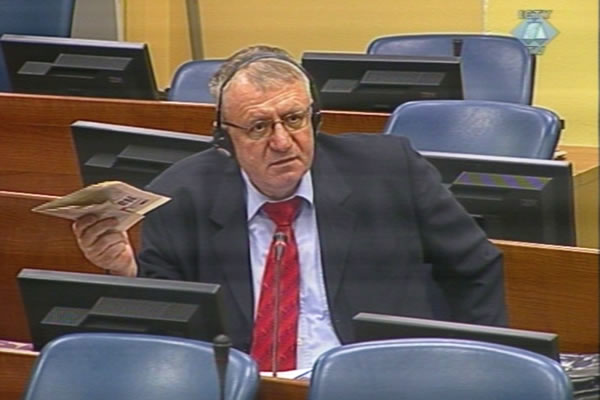Home
PROSECUTION ADAMANT: SESELJ MUST GO BACK TO THE HAGUE
The prosecution has filed an appeal against the Trial Chamber’s decision to dismiss its initial motion for Vojislav Seselj's return to the detention unit. The prosecution alleges Seselj has breached the ‘minimal conditions’ for the provisional release. In his public statements Seselj has vowed he will never return voluntarily to The Hague and threatened victims and witnesses who have testified at his trial
 Vojislav Seselj in the courtroom
Vojislav Seselj in the courtroom In its decision last week, the Trial Chamber dismissed the prosecution’s motion to revoke Vojislav Seselj’s provisional release and to order him to return to The Hague. The Chamber, led by French judge Antonetti, ruled that the prosecution had failed to file its motion against the provisional release decision on time. Theodor Meron, the Tribunal’s President, made a similar point in November 2014, soon after the provisional release of the Serbian Radical Party leader. According to Meron, the prosecution's appeal ‘has never reached the Appeals Chamber’. Today, the mistake was corrected and the prosecution submitted its appeal against Seselj’s provisional release.
The accused was provisionally released after the Trial Chamber issued its own-initiative decision on 6 November 2014. By a two-to-one majority,the judges decided to release Seselj despite the fact that he had never filed a motion for provisional release, or at least not in the proper format. Since his return to Serbia, Seselj has been quite outspoken in his public statements, vowing he will not return voluntarily to The Hague. As he has said, he will wait for the Serbian authorities to arrest him. According to the prosecution,Seselj has thus breached one of the two minimal conditions for the provisional release – to return to detention unit in The Hague voluntarily when required to do so.
According to the prosecution, Seselj has also breached the second minimal condition – not to threaten the victims and witnesses in his case. Seselj, it was noted in the motion, has made public statements threatening persons who have cooperated with prosecution. The prosecution stressed that when Seselj congratulated Serbian Chetniks on their successful operations and advocated the Greater Serbia, he in fact attacked the victims of the crimes he is charged with. Seselj was granted provisional release ‘for humanitarian reasons’, because of his ill health. The prosecution notes that Seselj's public statements have undermined the claims that he is very ill. That is yet another reason why Seselj must be ordered to return to the detention unit, the prosecution argued.
Similar arguments were listed in the previous motion submitted by the prosecution to the Trial Chamber. The judges did not consider the arguments at all, the prosecution notes, ‘focusing instead on an irrelevant question’ – why the prosecution had failed to appeal against the decision on Seselj's provisional release. According to the prosecution, the Trial Chamber erred when it failed to impose more stringent conditions for provisional release following Seselj’s public statements in which he attacked the victims and witnesses and announced his intent not to return voluntarily to The Hague. Such conditions comprise handing over the passport to the Serbian authorities, avoiding every contact whatsoever with victims and witnesses and not obstructing administration of justice. All of the accused who have been granted provisional release by the Tribunal have had to comply with those conditions.
The Appeals Chamber and the Tribunal’s President Theodor Meron will now have to rule on the prosecution's appeal.
Linked Reports
- Case : Seselj
- 2015-01-13 SESELJ REMAINS IN SERBIA
- 2014-12-25 SESELJ: DISICPLINE BRAMMERTZ; BRAMMERTZ: DON’T LISTEN TO SESELJ
- 2014-12-01 BRAMMERTZ: BRING SESELJ BACK TO THE HAGUE
- 2015-02-06 SESELJ RESPONDS TO PROSECUTOR’S MOTION
- 2015-03-30 SESELJ ORDERED TO RETURN TO THE HAGUE
- 2015-04-10 TRIAL CHAMBER IN NO RUSH TO BRING SESELJ BACK TO THE HAGUE
